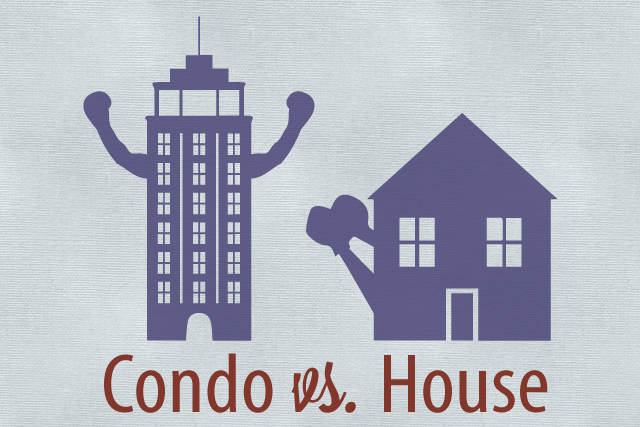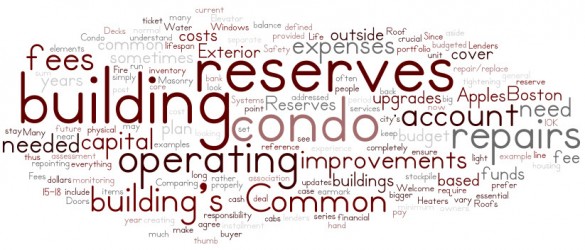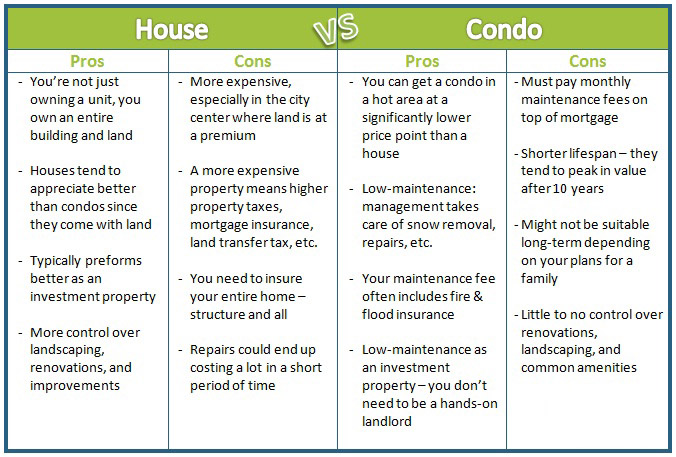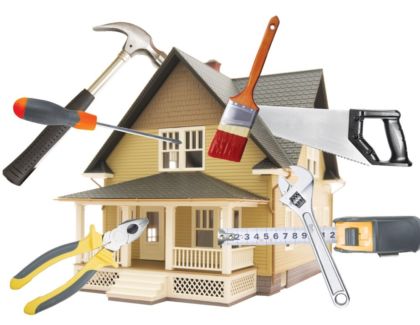Condo vs House - What You Need to Know...
Posted by Steve Harmer on Thursday, September 15th, 2016 at 2:30pm.
 With the average price of a detached home in cities such as Toronto now above the $1million mark, for many, condos have become the new starter home and possibly the domicile option for years to come.
With the average price of a detached home in cities such as Toronto now above the $1million mark, for many, condos have become the new starter home and possibly the domicile option for years to come.
First time home buyers are plagued with a whirlwind of decisions when looking for the perfect place to settle down. From locations to schools and public transportation, there’s one major consideration that will determine your type of lifestyle for the years to come, house or Condo. After coming to terms with the loads of money you’ll be borrowing, you’ll have to decide on whether you want to live in a condo vs house. But there are some major differences between house ownership and owning a condo. Here are some key factors to keep in mind.
Fees For All
For many, one of the advantages of condo living over home ownership is that you’ll never have to worry about watering lawns or shoveling the snow, as all the exterior maintenance is taking care of by the condo corporation. But as an owner, you’ll be responsible for a portion of the cost of those services, and more.
On top of your mortgage payment, you’ll have one other recurring monthly bill: condo fees. These fees cover a number of ongoing costs that the building requires, from the salaries of maintenance crews and the security guards manning the front desk, to snow removal around the property and the cost of repairing or  replacing damaged items in common areas, such as the lobby or fitness centre. A portion the condo fee also gets set aside for a “reserve fund” that’s set up to cover the cost of major expenses the building will incur down the road.
replacing damaged items in common areas, such as the lobby or fitness centre. A portion the condo fee also gets set aside for a “reserve fund” that’s set up to cover the cost of major expenses the building will incur down the road.
While your mortgage payment will drop as you pay off the principal, condo fees will inevitably rise, often with a significant jump within a year or two of occupation as the developer usually low-balls the cost of keeping things running. Keep in mind that the more fancy features your building has – fully equipped gyms, rooftop pool, water-feature in the lobby – the more things there are that will eventually have to be repaired or replaced.
But don’t be surprised if your monthly fees do not cover the cost of everything. Before he moved into his first condo, Toronto condo owner Kelly Huang says, “I thought that paying maintenance fees meant that I didn’t have to worry about repairs. But the stuff behind the walls – vents, pipes, etc. – might be your responsibility.”
A Shared Lifestyle
As a condo owner, you have to recognize that you have shared ownership of the building and all its parts, which can lead to some, let’s say, differences of opinion. In its handy Condominium Buyer’s Guide, the Canada Mortgage and Housing Corporation refers to “the three Ps” – pets, people, parking – as key sources of contention for condo owners, with pets being far-and-away the most hotly disputed areas.
This issue has been highlighted in a recent news story about an Edmonton couple who were given notice that they had 90 days to either get rid of their 120-lb dog, or move out of the condo. The condo’s bylaws stipulate the maximum size of a resident’s dog is capped at 30-lbs, but the rules hadn’t been enforced until  after the condo board president’s boxer passed away.
after the condo board president’s boxer passed away.
“If you have a dog, then be prepared for some battles,” says Huang, who’s lived in two different condos in Toronto, and has seen “dog owners going to war with non-dog owners in both buildings.” The biggest issue is, obviously enough, owners who don’t pick up after their pet. But an excessively loud or yappy dog can also put you in violation of a building’s noise bylaws.
Those bylaws apply to the human occupants as well. Much as excessive late-night partying can get you in trouble with a landlord – and possibly see you facing eviction – frequent noise complaints could see your condo board voting to push you out.
Most buildings have a party room that you can rent for special occasions, but there are restrictions on use of that as well. In Huang’s building the party room “has to be shut down by 1 am, and you have to be out by then, so you have to start cleaning up earlier than that.”
The third “P” on the CMHC’s list is parking because of rules limiting what you can park in your pricey spot – some prohibit using them to store things like boats or even a work truck – and if you’re a hobbyist mechanic, you might have to find a different spot to do your tinkering.
Holidays On Hold
 Condo bylaws can also limit your ability to express yourself during holidays, Hallmark or otherwise. Most, for example, prohibit bringing real Christmas trees into the building to avoid a mess of pine needles littering all the common hallways. Even exterior decorations on your apartment’s door can be limited or prohibited. And if you have kids that are keen on going trick-or-treating, you’ll have to take them out to do the rounds on neighbouring residential streets.
Condo bylaws can also limit your ability to express yourself during holidays, Hallmark or otherwise. Most, for example, prohibit bringing real Christmas trees into the building to avoid a mess of pine needles littering all the common hallways. Even exterior decorations on your apartment’s door can be limited or prohibited. And if you have kids that are keen on going trick-or-treating, you’ll have to take them out to do the rounds on neighbouring residential streets.
Other factors in choosing if a Condo is the right place for you.
Affordability
Condo’s can be considered as a starter home, the stepping stone to building equity before jumping into “real” home ownership. House ownership, at a minimum, comes at double the cost. With the current prices of real estate in the Vancouver and Toronto areas, owning a house remain a pipe dream for most of those  starting out.
starting out.
Monthly Expenses
Condo owners pay a fixed monthly maintenance fee based on the size of their units to cover the building’s operations. A portion of the fee goes towards utilities while the rest is reserved for future repairs and amenities, like party rooms, pools, gyms, and guest suites. Some fancy condos even offer tennis courts, bowling alleys and movie theaters. There a few factors that affect the condo fee, but the more amenities at the condo, the higher the fees.
The utilities associated with a house are generally lower than condo maintenance fees. House owners pay for electricity, gas and water separately based on unit rates; they can directly affect and lower the cost by controlling energy consumption. Condo living comes at a premium. Amenities are nice, but often go unused. Utilities paid by house owners are less than maintenance fees and efficient energy usage can result in lower bills.
Space
A 2 bedroom condo is the perfect size for two, the second bedroom can used as a office or an occasional bedroom if needed. If a couple chooses to start a family then things can change, all of the office things would have to be taken out of the spare bedroom and make way for the new addition to the family; the office will have to be portable!
Houses have rooms for multiple kids, offices, and guest rooms. Garages have space for second cars and bikes. Summer afternoons can be spent enjoying a bbq in the backyard by the pool. Kids can shoot hoops on the driveway. An argument can be made for those looking to downsize that less space is more desirable  therefore the condo would rule in that scenario but for the expanding younger family maybe a house is better.
therefore the condo would rule in that scenario but for the expanding younger family maybe a house is better.
Property Maintenance
Condo owners are on the hook for repairs inside their units. For the most part, that translates to changing the occasional light bulb and maybe calling someone if an appliance is on the fritz. There isn’t much else to it. Major repairs, landscaping and snow shoveling are taken care by the condo fees.
Homeowners not only have to take care of maintenance inside the house, but also the things on the outside. Cleaning the rain gutters, yard work and lawn care are time consuming. Homeowners are also on the hook for any unexpected expenses, from frozen pipes to roof repairs.
If you aren’t particularly handy and don’t care to be, condo living is for you. However, condo owners may have to pony up cash for major repairs via a special assessment in poorly managed condo corporations. Home maintenance is more time consuming and can get expensive pretty quickly.
Convenience
Condo dwellers have to live with elevators. Bring groceries home sometimes requires multiple trips up and down. Home owners can pull right into their driveway and unload everything quickly. If you forget something in the car, it doesn’t take 10 minutes to go get it. Leaving a house for work in the morning probably takes 30 seconds. The unfortunate condo dweller with a parking spot in P4 spends much more time circling around to get out of the garage. Condo owners require board approval prior to any major renovation. Homeowners have the freedom to make whatever changes they want whenever they want.
The only thing I can think of that’s convenient about living in a condo is that I don’t have to scrape snow off my car since it’s parked in an underground garage. Then again, a home with the a garage would net the same result. I guess condo owners don’t have to shovel the driveway?
© https://www.ratesupermarket.ca/blog/condo-rules-what-you-need-to-know/

